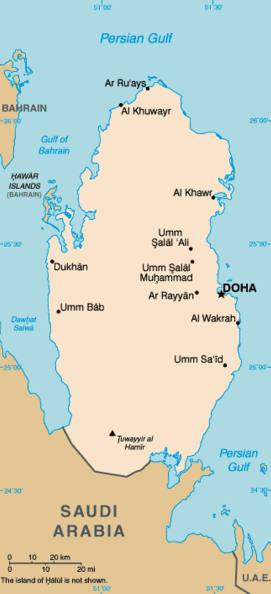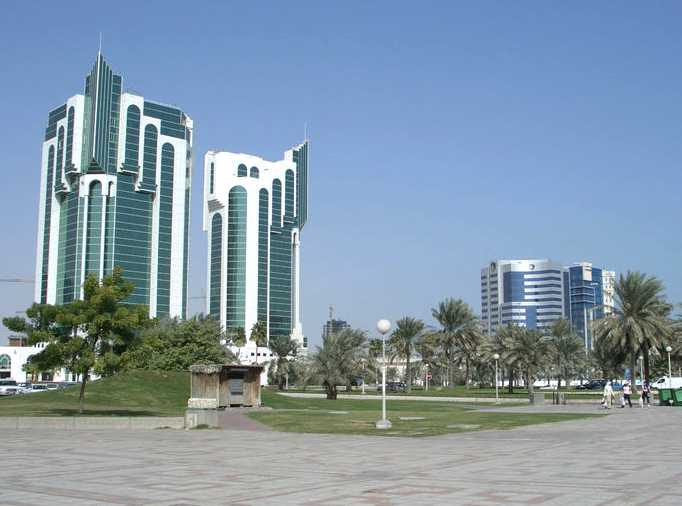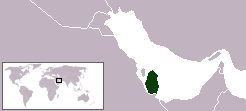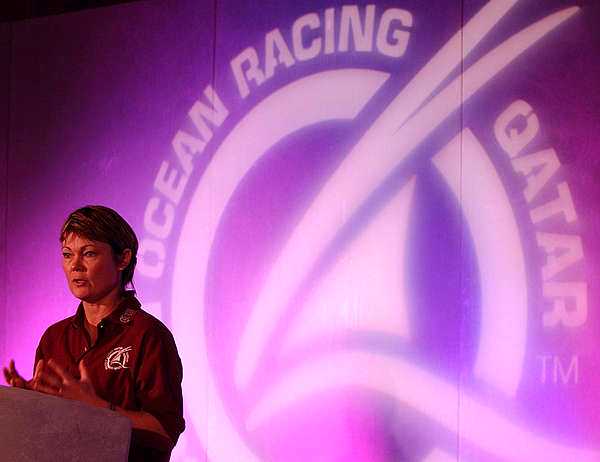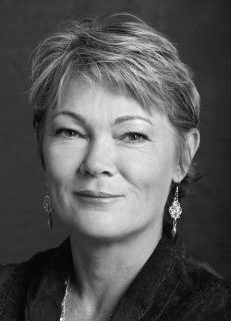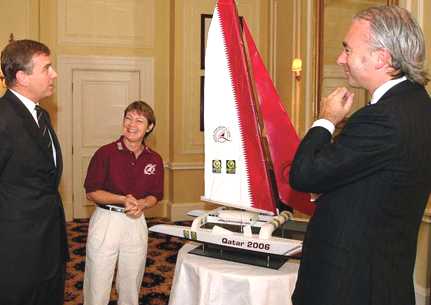|
QATAR
Please use our A to Z INDEX to navigate this site
|
|||||||||||||||||||||||||||||||||||||||||||||||||||||||||||||||||||||||||||||||||||||||||||
|
Qatar (Arabic:قطر ), officially the State of Qatar (Arabic:دولة قطر transliterated as Dawlat Qatar), is an emirate in the Middle East and Western Asia, occupying the small Qatar Peninsula on the northeasterly coast of the larger Arabian Peninsula. It is bordered by Saudi Arabia to the south; otherwise the Persian Gulf surrounds the state.
Map of Qatar
History
Qatar forms one of the newer emirates in the Arabian Peninsula. After domination by Persians for thousands of years and more recently by the Ottoman Turks, and finally by the British, Qatar became an independent state on September 3, 1971. Unlike most nearby emirates, Qatar declined to become part of either the United Arab Emirates or of Saudi Arabia.
Although the peninsular land mass that makes up Qatar has sustained humans for thousands of years, for the bulk of its history the arid climate fostered only short-term settlements by nomadic tribes. Clans such as the Al Khalifa and the Al Saud (which would later ascend the thrones of Bahrain and of Saudi Arabia respectively) swept through the Arabian peninsula and camped on the coasts within small fishing and pearling villages. The clans battled each other for lucrative oyster beds and lands, frequently forming and breaking coalitions with one another in their attempts to establish territorial supremacy.
The British initially sought out Qatar and the Persian Gulf as an intermediary vantage point en route to their colonial interests in India, although the discovery of oil and other hydrocarbons in the early twentieth century would re-invigorate their interest. During the nineteenth century, the time of Britain’s formative ventures into the region, the Al Khalifa clan reigned over the Northern Qatari peninsula from the nearby island of Bahrain to the west. Although Qatar had the legal status of a dependency, resentment festered against the Bahraini Al Khalifas along the eastern seaboard of the Qatari peninsula. In 1867, the Al Khalifas launched a successful effort to quash the Qatari rebels sending a massive naval force to Wakrah. However, the Bahraini aggression was in violation on the 1820 Anglo-Bahraini Treaty. The diplomatic response of the British to this violation set into motion the political forces that would eventuate in the founding of the state of Qatar. In addition to censuring Bahrain for its breach of agreement, the British Protectorate (per Colonel Lewis Pelly) asked to negotiate with a representative from Qatar. The request carried with it a tacit recognition of Qatar’s status as distinct from Bahrain. The Qataris chose as their negotiator the respected entrepreneur and long-time resident of Doha, Muhammed bin Thani. His clan, the Al Thanis, had taken relatively little part in Persian Gulf politics, but the diplomatic foray ensured their participation in the movement towards independence and their dominion as the future ruling family, a dynasty that continues to this day. The results of the negotiations left Qatar with a new-found sense of political selfhood, although it did not gain official standing as a British protectorate until 1916.
The reach of the British Empire diminished after the Second World War, especially following Indian independence in 1947. Pressure for a British withdrawal from the Arab emirates in the Persian Gulf increased during the 1950s, and the British welcomed Kuwait's declaration of independence in 1961. When Britain officially announced in 1968 that it would disengage politically, though not economically, from the Persian Gulf in three years' time, Qatar joined Bahrain and seven other Trucial States in a federation. Regional disputes however, quickly compelled Qatar to resign and declare independence from the coalition that would evolve into the seven-imarat United Arab Emirates. In 1971, Qatar became an independent sovereign state.
Since 1995, Emir Hamad bin Khalifa Al-Thani has ruled Qatar, seizing control of the country from his father Khalifa bin Hamad Al Thani while the latter vacationed in Switzerland. Under Emir Hamad, Qatar has experienced a notable amount of sociopolitical liberalization, including the enfranchisement of women, a new constitution, and the launch of Al Jazeera, the controversial Arabic language satellite television news channel. Qatar ranks as the eleventh richest country in the world per capita .
Qatar served as the headquarters and one of the main launching sites of the US invasion of Iraq [3] in 2003.
In 2005, a suicide-bombing killed a British teacher at the Doha Players Theatre, shocking a country that had not previously experienced acts of terrorism. It is not clear if the bombing was committed by an organized terrorist group, and although the investigation is ongoing there are indications that the attack was the work of an individual, not a group.
The United States Armed Forces Unified Combatant Command unit for the Middle East theater, known as CENTCOM (US Central Command), has its headquarters in Qatar.
Qatar held the 15th Asian Games in December 2006.
Qatari desert
Administrative divisions
Qatar is divided into ten municipalities (Arabic: baladiyah), also occasionally translated as governorates or provinces:
Economy
Before the discovery of oil the economy of the Qatari region focused on fishing and pearling. After the introduction of the Japanese cultured pearl onto the world market in the 1920s and 1930s, Qatar's pearling industry faltered. However, the discovery of oil reserves, beginning in the 1940s, completely transformed the nation's economy. Now the country has a high standard of living, with many social services offered to its citizens and all the amenities of any modern nation.
Qatar's national income primarily derives from oil and natural gas exports. The country has oil estimated at 15 billion barrels (2.4 km³), while gas reserves in the giant north field (South Pars for Iran) which straddles the border with Iran and are almost as large as the peninsula itself are estimated to be between 800-900tcf (Trillion Cubic Feet - 1tcf is equal to around 80 million barrels of oil equivalent). Qataris' wealth and standard of living compare well with those of Western European nations; Qatar has the highest GDP per capita in the Middle East. With no income tax, Qatar is also one of the two least-taxed sovereign states in the world.
While oil and gas will probably remain the backbone of Qatar's economy for some time to come, the country seeks to stimulate the private sector and develop a "knowledge economy". In 2004, it established the Qatar Science & Technology Park to attract and serve technology-based companies and entrepreneurs, from overseas and within Qatar. Qatar also established "education city" which consists of international colleges. For the 15th Asian Games in Doha, it established a "sports city"
consisting of Khalifa stadium, the Aspire Sports Academy, aquatic centres, exhibition centres and many other sports related buildings and centres. Qatar also plans to build an "entertainment city" in the future.
Qatar is aiming to become a role model for economic and social transformation in the region. Large scale investment in all social and economic sectors will also lead to the development of a strong financial market.
The Qatar Financial Centre (QFC) provides financial institutions with a world class financial services platform situated in an economy founded on the development of its hydrocarbons resources. It has been created with a long term perspective to support the development of Qatar and the wider region, develop local and regional markets, and strengthen the links between the energy based economies and global financial markets.
Apart from Qatar itself, which needs to raise the capacity of its financial services to support more than $130 billion worth of projects, the QFC also provides a conduit for financial services providers to access nearly $1 trillion of investment across the GCC as a whole over the next decade.
The largest project ever in Qatar, the new town of Lusail, is under construction.
Qatar's great wealth is most visible in its capital, Doha
Geography
The Qatari peninsula juts 100 miles (160 km) into the Persian Gulf from Saudi Arabia and is slightly smaller than Connecticut. Much of the country consists of a low, barren plain, covered with sand. To the southeast lies the spectacular Khor al Adaid ("Inland Sea"), an area of rolling sand dunes surrounding an inlet of the Gulf.
The highest point in Qatar occurs in the Jebel Dukhan to the west, a range of low limestone outcrops running north-south from Zikrit through Umm Bab to the southern border, and reaching about 295 feet (90 m) ASL. This area also contains Qatar's main onshore oil deposits, while the natural gas fields lie offshore, to the northwest of the peninsula.
Population
Nearly all Qataris profess Islam. Besides ethnic Arabs, much of the population migrated from various nations to work in the country's oil industry. Arabic serves as the official language. However English as well as many other languages are spoken in Qatar.
Expatriates form the majority of Qatar's residents. The petrochemical industry has attracted people from all around the world. Most of the expatriates come from South Asia and from non-oil-rich Arab nations. Because a large percentage of the expatriates are male, Qatar has the most heavily skewed sex ratio in the world, with 1.88 males per female [4].
In 2004, the country had a total population of approximately 744,000, of whom approximately 200,000 were believed to be citizens. Of the citizen population, Shi'a Muslims account for approximately 10 percent and Sunni Muslims comprise the remaining 90 percent. The majority of the estimated 544,000 non-citizens are individuals from South and South East Asian and Arab countries working on temporary employment contracts along with their accompanying family members. They are of the following faiths: Sunni and Shi'a Muslims, Christians, Hindus, Buddhists, and Baha'is. Most foreign workers and their families live near the major employment centers of Doha, Al Khor, Messaeed, and Dukhan.
The Christian community is a diverse mix of Indians, Filipinos, Europeans, Arabs, and Americans. It includes Catholic, Orthodox, Coptic, Anglican, and other Protestant denominations. The Hindu community is almost exclusively Indian, while Buddhists include South and East Asians. Most Baha'is in Qatar may come from nearby Iran. Religion is not indicated on national identity cards and passports, nor is it a criterion for citizenship in Qatar according to the Nationality Law. However, Qatari citizens are either Sunni or Shi'a Muslims with the exception of a Baha'i and Syrian Christian and their respective families who were granted citizenship. Shi'a, both citizens and foreigners, may attend a small number of Shi'a mosques.
No foreign missionary groups operate openly in the country.
Culture
Qatar explicitly uses Wahhabi law as the basis of its government, and the vast majority of its citizens follow this specific Islamic doctrine. Muhammad ibn Abd al-Wahhab founded Wahhabism, a puritanical version of Islam which takes a literal interpretation of the Qur'an and the Sunnah. In the eighteenth century, Abd Al-Wahhab formed a pact with the al-Saud family, the founders of Saudi Arabia.
In the early twentieth century, when the Al-Thanis realized that converting to the doctrine of their larger neighbor might bode well for the survival of their regime, they imported Wahhabi Islam from Saudi Arabia to Qatar. Perhaps as an effect of the importation, Wahhabism takes a more tolerant form in Qatar than in Saudi Arabia, though it still governs a large portion of Qatari mores and rituals. For example, almost all Qatari women wear the black abaya (also donned in Saudi Arabia); the government, however, does not impose the style universally. The abaya is mainly passed down from generation to generation and is still present because of the traditional values of the country.
Shi'as comprise just over 10% of the Muslim population
Qatari law
When contrasted with other Arab states such as Saudi Arabia, for instance, Qatar has comparatively liberal laws, but is still not as liberal as some of its neighbors like UAE or Bahrain. Women can drive in Qatar, whereas they may not legally drive in Saudi Arabia.
The country has undergone a period of liberalization and modernization after the current Emir of Qatar, Hamad bin Khalifa Al-Thani, came to power after becoming Emir in place of his father. Under his rule, Qatar became the first Persian Gulf country where women gained the right to vote. Also, women can dress mostly as they please in public (although in practice local Qatari women generally don the black abaya). Before the liberalization, it was taboo for men to wear shorts in public. The laws of Qatar tolerate alcohol to a certain extent. However, public bars and nightclubs in Qatar operate only in expensive hotels, much like in the emirates and Bahrain, though the number of establishments has yet to equal that of UAE. Qatar has further been liberalized due to the 15th Asian Games, but is cautious of becoming too liberal in their law making the country a viable weekend immigration from their western neighbor. Overall Qatar has yet to reach the more western laws of Dubai or Bahrain, and though plans are being made for more development, the government is cautious.
Education
In recent years Qatar has placed great emphasis on education. Along with the country’s free healthcare to every citizen, every child has free education from kindergarten through to university. The country has one university, the University of Qatar, and a number of higher educational institutions. Additionally, with the support of the Qatar Foundation, some major American universities have opened branch campuses in Education City, Qatar. These include Carnegie Mellon University, Georgetown University, Texas A&M University, Virginia Commonwealth University and Cornell University's Weill Medical College. In 2004, Qatar established the Qatar Science & Technology Park at Education City to link those universities with industry. Education City is also home to a fully accredited International Baccalaureate school, Qatar Academy.
In November 2002, the Emir Hamad bin Khalifa al-Thani created the Supreme Education Council. The Council directs and controls education for all ages from the pre-school level through the university level, including the "Education for a New Era" reform initiative.
The Emir's second wife, Sheikha Mozah Bint Nasser Al-Missned, has been instrumental in new education initiatives in Qatar. She chairs the Qatar Foundation and is on the board of Qatar's Supreme Education Council.
Communications
Qatar has a modern Telecommunication system centered in Doha. Tropospheric scatter to Bahrain; microwave radio relay to Saudi Arabia and UAE; submarine cable to Bahrain and UAE; satellite earth stations - 2 Intelsat (1 Atlantic Ocean and 1 Indian Ocean) and 1 Arabsat. People can call to Qatar using their submarine cable, satellite or using VoIP (Voice over Internet Protocol); however, Qtel has interfered with VoIP systems in the past, and Skype's website has been blocked before.
Qtel's ISP branch, Internet Qatar, uses SmartFilter to block websites they deem inappropriate to Qatari interests and morality.
Al Jazeera (Arabic: الجزيرة, al-ğazīrä, [al.dʒaˈziː.ra], meaning "The Island") is a television network headquartered in Doha, Qatar. Al Jazeera initially launched as an Arabic news and current affairs satellite TV channel of the same name, but has since expanded into a network of several specialty TV channels.
Controversy
In 2003 Tracy Edwards set up Quest International Sports Events and signed a £6 million sponsorship deal with the Crown Prince of Qatar to create two round-the-world races and a marina complex. HSBC sponsored the first event to the tune of £3million. The Oryx Quest 2005 was a huge success and created $46m worth of press coverage for the gulf state. However, Qatar refused to pay Tracy the £8million she had borrowed to facilitate the event and pay the teams to enter. Qatar also refused to pay the $1million prize money. Quest consequently went into receivership and Tracy was forced into bankruptcy in September 2005.
She regularly gives her time for charity work and is Patron of The Ahoy Centre, Ambassador to the NSPCC working with CEOP (Child Exploitation and Online Protection) and Ambassador of One Parent Families. Tracy also supports The Lady Taverners and The Prince's Trust.
Tracy is a unique speaker having experienced not only the upsides of winning but also the devastation of taking a calculated risk that resulted in financial ruin. She speaks eloquently and is disarmingly open about success and failure. The biggest lessons in life are learnt when things go wrong and Tracy's story of battling against the odds to survive is poignant and truly revealing.
Possibly the most extraordinary and horrifying part of 2005 for Tracy and her family were the 28 days that Tracy was held against her will in Qatar whilst the authorities tried to force her to sign a waiver exonerating them from the sponsorship. Tracy refused to sign, exhibiting the strength of character, fearlessness and tenacity that have characterised her sailing projects. Her refusal to sign and her fighting spirit ensured that legal action against Qatar could commence in the hope that she, her team and event suppliers can one day be compensated.
There are many lessons to be learned from Tracy's experiences of massive successes and devastating failure. In addition, Tracy has lost none of the sparkle and humour that audiences warm to and make her one of the most inspirational speakers of today.
Tracy Edwards
THE INDEPENDENT - Tracy Edwards declared bankrupt 05 September 2005The record-breaking round-the-world yachtswoman Tracy Edwards was declared bankrupt today.
Miss Edwards, who is 43 today, did not attend the 10-minute hearing at the London Bankruptcy Court and was not represented by lawyers.
Mrs Registrar Derrett made the order after ruling that all the necessary papers were in order. The bankruptcy petition for about £60,000 was brought by Gregory Browne, the former financial director of Miss Edwards' company, Quest, who was dismissed last year.
Miss Edwards, who has been reported as having personal debts of £8 million, expects to lose the farmhouse she shares in Yattendon, near Reading, Berkshire, with her mother Patricia and five-year-old daughter, Mackenna.
The former sportswoman of the year received an MBE in 1990 after skippering the first all-female round the world crew.
http://news.independent.co.uk/uk/legal/article310455.ece
THE BBC
The 43-year-old, who was awarded an MBE for skippering the first all-women crew around the world, is now building a new life with her daughter in the Gulf.
In February, Ms Edwards said the debts she owed to sponsors made her life "a misery" and forced her to leave the UK.
The bankruptcy petition for £60,000 was brought by Gregory Browne, the former financial director of her company, Quest, who was dismissed last year.
The loan for her yacht and money owed to crew and promotions companies amounted to £6.3m.
However, it has been reported that Ms Edwards, who was brought up in Swansea, south Wales, has personal debts of £8m.
It is thought she could lose the farmhouse she shared with her five-year-old daughter and mother in Yattendon, near Reading, Berkshire.
Miss Edwards did not attend the 10-minute hearing at the London Bankruptcy Court and was not represented by lawyers.
http://news.bbc.co.uk/1/hi/england/berkshire/4215446.stm
Tracy Edwards Plans to Sue Qatar - April 3 - Qatar
In a stunning ruling, a civil court in Qatar has ruled that British yachtswoman Tracy Edwards is not responsible for massive debts she incurred when Qatar Sports International - an organization set up by the Crown Prince to promote the image of Qatar - reneged on an agreement to sponsor the 2005 Oryx Quest race. It's a remarkable ruling because the civil court judge essentially ruled against his own government, clearing the way for Edwards to file a personal injury suit after having to declare bankruptcy and liquidate her company, Quest International Sports Events Ltd. She plans on filing suit in the International Court of Justice in The Hague.
Britain's Prince Andrew, Tracy Edwards and Perry Smith of QSI
Of the ruling, Edwards said, "It is important to me, and those who have supported me through the past two years, to prove that I did nothing wrong and to set the record well and truly straight. This is the first step in our legal action to justly compensate the Quest creditors, my team and me, for the debt that is owed."
Having been discharged in September 2006, Tracy is now rebuilding her life, consulting for companies doing business in the Middle East, doing motivational and teambuilding presentations and pursuing legal action against Qatar. Tracy is a unique speaker having experienced not only the upsides of winning but also the devastation of taking a calculated risk that resulted in financial ruin. She speaks eloquently and is disarmingly open about success and failure. The biggest lessons in life are learnt when things go wrong and Tracy's story of battling against the odds to survive is poignant and truly revealing. Tracy has lost none of the sparkle and humour that audiences warm to and make her one of the most inspirational speakers of today.
Edwards
describes 'debt misery'
Yachtswoman
pays her 'loyal' crew
Yachting
heroine must repay loan
Yachtswoman Edwards'
home 'saved'
Yachtswoman
banned from driving
Edwards
unveils plans
Edwards
eyes Jules Verne mark
If you would like to read more on this subject, we recommend that you visit Tracy's website at the address: www.tracyedwardsqatar.com
LINKS and REFERENCE
Solar Cola drinkers care about planet earth
.. Thirst for Life
(330ml Planet Earth can)
|
|||||||||||||||||||||||||||||||||||||||||||||||||||||||||||||||||||||||||||||||||||||||||||
|
This website is Copyright © 1999 & 2024 Max Energy Limited an educational charity working hard for world peace. The bird logos and names Solar Navigator, Blueplanet Ecostar and Utopia Tristar are trademarks. All rights reserved. All other trademarks are hereby acknowledged.
|
|||||||||||||||||||||||||||||||||||||||||||||||||||||||||||||||||||||||||||||||||||||||||||
